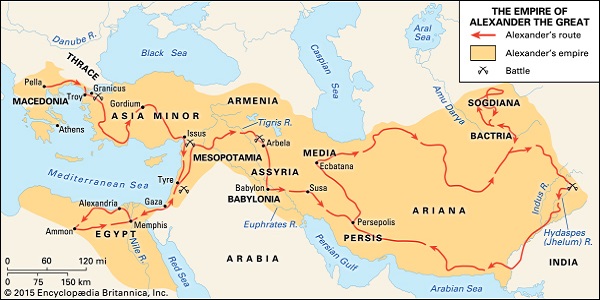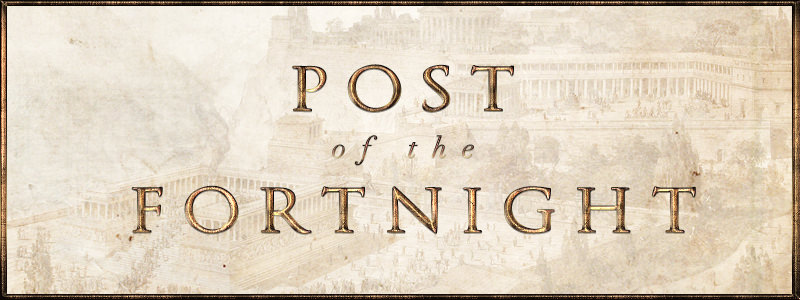“I am indebted to my father for living, but to my teacher for living well.” –Alexander the Great
Alexander is generally considered one of the most accomplished and influential military leaders of all-time, but when balancing the realm of his feats and accomplishments its clear he had a ton of help:

Who then among Alexander's many contemporaries (rivals, mentors, or companions) deserves to be recognized alongside Alexander?
Note: this is not a thread about who primarily deserves credit for Alexander's success (lady luck deserves first place for that) but rather who might have taught or influenced Alexander the most.
Which person had the greatest impact on Alexander?

Alcibiades being taught by Socrates
Some nominations:
Philip II - The most obvious choice. No other person can claim more credit for Alexander's generalship, education, military training, political upbringing, and art of war then Philip II of Macedon (creating an army and phalanx system that Alexander used to conqueror the known world -in this discussion- doesn't count). Philip was also the one who introduced Alexander to Aristotle at age 13, army life at age 16, made Alexander his regent (also age 16), and appointed Alexander a major command post at the Battle of Chaeronea (age 18). Philip again, was also the one who shared with Alexander the original battle plans for the conquest of Persia.
If the criteria of a great teacher then is providing ample opportunities for the student to learn, participate, and observe, then Philip II wins first place. Where Philip falls short of course are the marriage disputes, jealousy, and "daddy issues," (at one point leading to Alexander's exile) and the fact that Philip's sudden assassination (both a curse and boon for Alexander) created loyalty issues with Philip's old guard. Alexander would struggle for their trust and support for much of his adult life (though the unending desire to escape his father's shadow and prove his worth time and again could also be used as an influence argument in Philip's favor).
Olympias - The next obvious choice. Alexander, according to some historians, was spurred on by his mother. From his mother he gained a fiery and violent temper, as well as an inclination towards rage, privilege, and entitlement. It was Olympias after all who first whispered into Alexander's ear that he was divine and that he should be king over his petulant father. To Olympias's credit she also taught Alexander to disregard most material possessions (through Leonidas's mentorship and religious piety) and how to use back-channel manipulation for political gain. Nobody assisted Alexander's rise to the throne more than Olympias, though her unconfirmed role in Philip's assassination of course, does not count as influence in this discussion.
Aristotle - One of the most brilliant minds who has ever lived and Alexander's teacher for three years. Would have taught philosophy, literature, rhetoric, geography, mathematics, geometry, and basic zoology; the equivalent of a privileged education in Greece. Beyond that however, it is highly speculative whether Alexander (a man of action) was really all that influenced by the great thinker.
Achilles - Alexander's favorite superhero. To Achilles, Alexander owes his personality as well as his disregard for physical danger, his love of risk taking, single-combat, blood and battle, and life or death defying courage. Achilles influence on Alexander is all the more impressive considering (according to Arrian) that Alexander was not of a very impressive build and probably not that athletic. No doubt though, Alexander still deserves credit for being one of the most courageous (or insane) warrior kings to have ever lived.
Darius III- Darius was Alexander's greatest rival who held the title "king of kings" and most commanding man in the world before Alexander. If you believe then that Alexander was motivated by glory (which his conquests and adoption of Darius's family, titles, and kingdom as his own seems to suggest) then Darius's mere existence had a huge impact on Alexander. It was Alexander after all, who desperately wanted to be Darius (king of kings), and hurriedly chased after him in every battle.
Cyrus the Great - If you believe Alexander was a benevolent ruler (not sure if he was really a peacemaker in my opinion, but to each his own), then you may point to Cyrus the Great as having had the greatest impact on Alexander. Before great kings bowed at the tomb of Alexander, they bowed before the tomb of Cyrus the Great, the greatest conquer and nation builder the world had ever known. Alexander did of course visit the tomb of Cyrus the Great where some say his cultural fusion plans were an attempt to relive and outdo the other's legacy.
Hephaestion - The most interesting pick and Alexander's closest friend. The only person Alexander may have considered an equal. At his death, Alexander insisted that Hephestion be worshiped as a god, where he also became manically depressed at his young friend's passing. Unfortunately however, most historical evidence shows that Hepahestion may have mostly lacked in any kind of obvious military skill or political talent. His role again seems to be more of a friend and companion than any kind of political adviser and second in command.
The Oracle at Swia - Famously proclaimed and confirmed that Alexander was the Son of Zeus. Obviously had a huge impact on Alexander's life.
Diogenes - The legendary stoic philosopher from Athens, and maybe the only person ever to b-slap Alexander philosophically and then live to tell about it. Legend has it that Alexander offered to Diogenes the entire world and as a gift anything he could possibly want, but to Diogenes' credit he appropriately told the boy king to go **** himself. Stunned by the philosopher's dignity and self worth, Alexander is quoted as saying he wishes he were more like Diogenes than anyone else who had ever lived. Alexander's constant whining and thin skin however, suggests that maybe Alexander never learned a thing from Diogenes.
Demosthenes and The Resistance Party - Demosthenes and Greek detractors were a constant thorn in young Alexander's side. If you believe then that Alexander had thin skin to the extreme, then his struggle to win a good name in Athens -and prove he was Greek- was a huge motivating force in his life.
The Army and General Staff - A point that is gaining more attention from historians and leadership experts. The argument is Alexander needed the army more than the army ever needed him (which could go either way; for example, what happens to the Macedonian army if Alexander dies in battle?) and the theory that his generals were constantly scheming to usurp him. In order then to maintain the army's loyalty and support, Alexander had to constantly lead by heroic selfless example. He had to constantly prove that he was the fittest and the bravest or somebody else from the Macedonian warrior culture would mutiny and take his place. Alexander therefore, was a slave to the ambitions of his generals and the moral needs of his army, constantly at war with both. In the end, Alexander pushed the army as far as it could go and may have exhausted himself in the process.
No one - The maverick pick. Alexander was a historical outlier. An adolescent, angry, genocidal, war-mongering megalomaniac and momma's boy who should give all the credit in the world to his incredible good fortunate. No alcoholic drunk, reckless gambler, or psychopathic prince has ever benefited so much from outcome bias. His accomplishments were either borrowed from the works of others or works of luck. He is more myth than man, but as a boy king he listened and looked up to no one. He truly believed he was a god and could do no wrong. War and glory (to include imposing his will on others) were thus his playground and his true legacy is that of an ego-centric narcissistic monster given way too much power to play with.
All the above - Another solid pick. Alexander is a complicated figure and it probably does no good to try and psycho analyze him. However, historians should still speculate whether somebody else without Alexander's unique tutelage and upbringing could also have conquered Persia. This is important when validating (or disproving) the Great Man Theory and its impact on history.
Philip II, Antiperer and Antiperer's son, Cassander, bring this last point into debate.
|
)






















